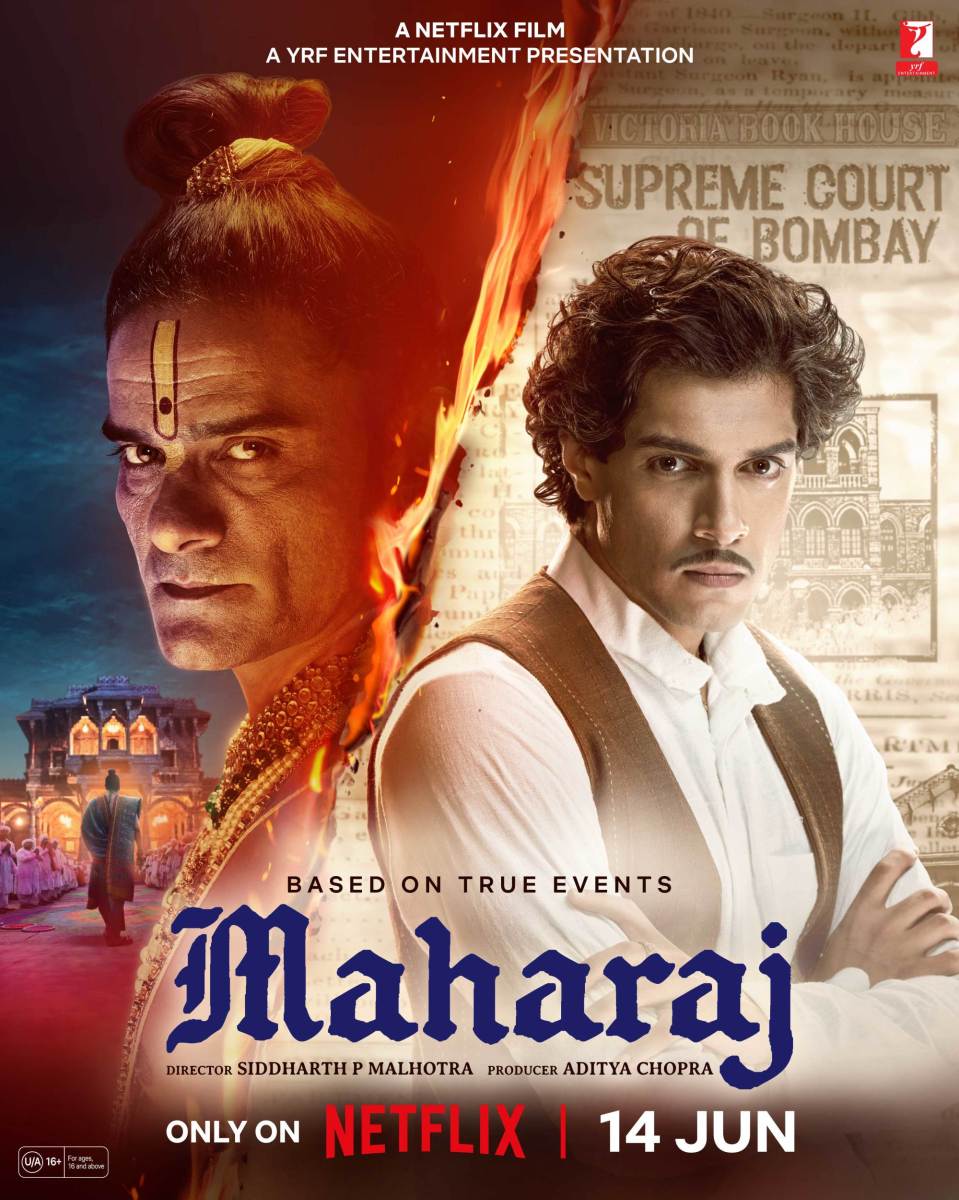
YRF and the curse of JJ – Beyond Bollywood
The controversial film doesn’t hurt any religious sentiments, but it also fails to do justice to the true story. Instead, it plays out like a quasi Jayeshbhai Jordaar. YRF has blundered by casting Junaid Khan, and even the brilliant Jaideep Ahlawat seems off-color.
Rating: ⭐️💫 (1.5 / 5)
By Mayur Lookhar
With so much noise surrounding it before its release, there wasn’t much suspense left about Maharaj [2024]. For those unfamiliar with this true story, curious individuals, including this reviewer, enlightened themselves about the Maharaj Libel Case of 1862, thanks to the digital age.
As the film faced a legal battle to secure its release, we questioned whether Yash Raj Films and Netflix made a mistake in backing a story where the alleged sexual exploitation was never proven, and the powerful religious leader was neither charged nor convicted. Moreover, can one trust the judgments of imperial courts during the British Raj?
Veteran lawyer A.G. Noorani procured records safeguarded by Bombay Bar historian P.B. Vacha. In an opinion piece, Noorani quoted Justice Arnould, one of the two judges, saying, “As there was no available spiritual tribunal, so neither was there any criminal or civil tribunal which could take cognizance of these immoralities of the Maharajas. It was profligacy, it was vice, but it was not crime, it was not civil wrong, of which they were accused. There was no violence; there was no seduction. The wives and daughters of these sectaries, (with their connivance in many cases if not with their approval), went willingly—went with offerings in their hands, eager to pay a high price for the privileges of being made one with Bramha by carnal copulation with the Maharaj, the living personification of Krishna.”

It must be recalled that it was a libel filed by Jadunath Brijratan Maharaj against journalist and fellow Pushtimarga community member Karsandas Mulji for a defamatory article in Gujarati newspaper Satyaprakash. Mulji had accused Jadunath, the Hindu sect of sexually exploiting women in the name of religion.

The YRF and Netflix film is based on Saurabh Shah’s 2013 book Maharaj. In 2021, a group of writers—Dhawal Patel, Maitri Goswami, Umang Shirodariya, Utkarsh Sharma, Pratyush Mehrishi, and Amit Bhatt—wrote Doctrine of Pushtibhaktimarga: A True Representation of the Views of Sri Vallabhacharya in the Context of the Maharaj Libel Case. We haven’t read either book, but basic information about them suggests that there could be some ambiguity here.
162 years later, what are the odds of uncovering the absolute truth? While tackling such stories, Bollywood usually carries a disclaimer of “based on true events,” but this text is often accompanied by a caveat that accuracy is not guaranteed, and there is liberty in dramatization. The Netflix and YRF film openly questions the practice of Charan Seva. While its simple meaning stands for loyalty towards an elderly revered person, in this film, Charan Seva is depicted as akin to the diabolical medieval European feudal practice of jus primae noctis (right of the first night). Add a paid audience to this immoral Seva, and it is sure to make you sick to your stomach.
The true meaning of Charan Seva and the teachings of the Pushtimarga sect are debates best left to the Pushtimarga community and its scholars. Here, we are simply reviewing director Siddharth P. Malhotra’s film.
Sexual exploitation, especially under the guise of religion, must be unequivocally condemned. Malhotra, along with writers Vipul Mehta (adapted story) and Sneha Desai (additional screenplay and dialogues), as well as YRF, deserve praise for daring to tell such a story. In our humble opinion, the film does not offend religious sentiments in any way.
Unfortunately, director Malhotra and his writers fail to do justice to this story. The average screenplay and the misfit cast deprive Netflix viewers of the compelling film this story merited. While the film does address the specific social evil, it appears more preoccupied with avoiding offense to the Pushtimarga Sect. Such tropes may be necessary to prevent controversy, but it can also undermine the cause.
The larger issue with Maharaj [2024] is its quasi-JJ syndrome. With key members of Maharaj’s palace divided over this practice, these scenes of silent activism partially echo the casual approach toward female feticide seen in Jayeshbhai Jordaar [2022]. However, this JJ syndrome isn’t limited to the earlier YRF film. We were curious about the pronunciation of JJ while addressing Yadunath Maharaj [Jaideep Ahlawat]. In Hindi or Gujarati, it’s usually pronounced as Jai Jai. While the film is set during British rule in India, the pronunciation of JJ by characters from the Pushtimarga community, like Karsandas Mulji [Junaid Khan], Kishori [Shalini Pandey], and others, sounds very English. Was this intentional? It just doesn’t quite connect.

There’s no shortage of JJs here, with the film’s lead cast featuring first-time actor Junaid Khan and the brilliant Jaideep Ahlawat portraying the antagonist Yadunath Maharaj, referred to as JJ. In a film that demands fearless journalism, one must be brutally honest in assessing Junaid Khan’s performance. Similar to how Aamir Khan chose Holi [1984], his son Junaid has also taken on a challenging subject for his debut film. In the past, Junaid might have faced criticism for his choice, but today’s era calls for standing out from the norm. However, given how Aamir Khan continues to face criticism for allegedly hurting Hindu sentiments in pk (2014), did the Bollywood superstar caution his son about the risks involved in choosing Maharaj? We remember Aamir mentioning in a video that children nowadays don’t listen.
Unlike his father, Junaid Khan falls short on talent. He lacks screen presence and does not possess a commanding voice. Moreover, his acting skills leave much to be desired. His dialogue delivery resembles that of a struggling emcee grappling even with a teleprompter. Watching Junaid Khan reminded us of the discomforting experience of seeing Sunny Deol’s son Karan in Pal Pal Dil Ke Paas [2019] or Suhana Khan in The Archies [2023]. Junaid’s underwhelming performance naturally raises questions about his casting in such a serious film.

Jaideep Ahlawat is an actor par excellence, consistently raising the bar with every film. While Ahlawat has clearly committed to the physicality of his character, the hairdo appears noticeably artificial. Playing a Godman, Ahlawat portrays a composed demeanor while addressing Karsandas Mulji’s accusations with a calm head. However, Maharaj isn’t hesitant to flaunt his aura even in the Supreme Court of Bombay, before British judges. With numerous devotees inside the court and thousands more waiting outside, one is left pondering if India truly was under British Raj.
Despite the serious accusations, we never sensed fear from Maharaj or his entourage. His calm demeanor likely contributed to his followers dismissing Mulji’s accusations as mere news reports. Ahlawat performs adequately, but the average screenplay and the underwhelming cast may have also contributed to his waning interest.

Shalini Pandey is talented, but her character Kishori seems like an extension of Kinjal from Jayeshbhai Jordaar [2022]. Pandey and Junaid Khan are not only separated by age but also by talent. Deep down, Pandey might be relieved that she didn’t have to share the screen space with Junaid for long.

The late Shiv Sena leader Manohar Joshi’s granddaughter Sharvari Wagh is unbearable as Viraaj, yet another character modelled on the lines of Ketaki Dave’s Daksha chachi in Kyunki Saab Bhi Kabhi Bahu Thi. Viraaj pops out of the crowd to cheer for Karsandas. In her next scene, she hops into his office and soon makes a marriage proposal. Thank goodness, Karsandas refuses it. Veeraj has a similar grievance, but not for a moment does this woman bear any mental scars.
His father, the brilliant Tom Alter, carved a career playing the clichéd evil British man in Bollywood jingoistic dramas. Jamie Alter, like his father, a cricket scribe, finds himself in a similar role as a clichéd British character, Anstey, the legal eagle for defendant Mulji. However, Jamie isn’t as gifted an actor as his late father.
In a court where British judges and lawyers dominate, Maharaj’s screenplay and writing are so unconvincing that they diminish Mark Bennington’s performance. Despite being set in 1862 during British Raj, Bailey’s [Bennington] actions reek of melodrama reminiscent of Bollywood films like Damini [1993].
The events depicted in Maharaj will undoubtedly spark debate, with fact and fiction likely to be dissected. The closing remarks in Justice Sausse’s order may contradict information in the public domain, a matter best left to experts within the Pushtimarga Sect.

If the music and lyrics aren’t good, why include them in a film? The first song was demanded by the screenplay, but once Yadunath Maharaj’s true character is revealed, the film could have done without the remaining tracks. Mind you, Sonu Nigam’s rendition of Achyutam Keshavam (Krishna Bhajan) is enjoyable, but it felt out of place in this narrative.
After all the hype, we expected YRF and Netflix to deliver a gripping film in Maharaj. However, the shabby screenplay, average direction, and below-par performances make you wonder if, without the external buzz, Maharaj would have struggled to attract attention. The Siddharth P. Malhotra directorial is a reminder that mankind should never elevate humans to the status of deities, a lesson applicable across all facets of life. We must not idolize individuals to the extent that they become beyond scrutiny. After all, gods did not write the scriptures. While the Maharaj Libel case gets lost in this lackluster film, we can hope Bollywood will address alleged sexual exploitation (casting couch) within its own confines. Dear Bollywood, are you brave enough? Rest assured, neither the Pushtimarga nor right-wing groups will protest against such efforts.
Watch the video review below.
Publisher: Source link



